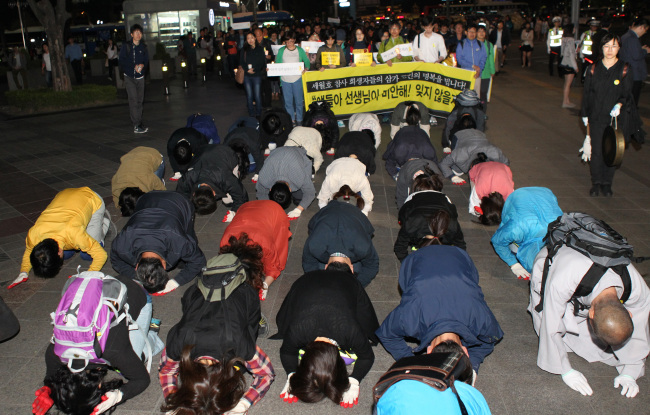Korean teachers recently protested en masse the government’s move to punish 43 teachers who criticized President Park Geun-hye, fueling the debate about how much leeway should be given to teachers taking political action.
On the homepage of presidential office Cheong Wa Dae, some 80 teachers on Wednesday urged the Education Ministry to cancel its earlier decision to punish the 43 teachers. They said that the government, which came under fire for its bungled response to the sinking of the Sewol that left 300 dead or missing, was very swift to punish those who pointed out its faults.
“The (43 teachers’) manifesto that Park should quit is a desperate cry and shows their will to make sure such a tragedy does not reoccur,” they said, urging the president to step down. The Education Ministry started discussing disciplinary action for those teachers on Thursday.
 |
Members of the Korean Teachers and Education Workers Union and other civic groups hold a performance on May 14 in memory of those who died in the sinking of the ferry Sewol in Seoul. (Yonhap) |
In Korea, the law requires civil servants to be politically impartial and they are banned from taking collective action unrelated to their jobs.
Since the ferry sinking, there has been an ongoing debate about how much teachers should be allowed to publicly express their opinions about politically sensitive issues. This hot-button issue also was covered by the candidates running for Seoul education chief in the June 4 local elections.
Cho Hi-yeon, the candidate from the liberal bloc, said teachers are entitled to their own political opinions.
“Teachers too are citizens of this country. They can express their opinions. The Sewol tragedy sparked nationwide fury (toward the government), and teachers should also be allowed to say that something is wrong,” he said. Cho said the trend of restricting teachers’ political expression should change in order for Korea to become an advanced country.
Conservatives on the other hand said teachers should not express their political opinions.
“Students should not be exposed to political prejudice. Teachers must refrain from collective actions driven by political motivation,” said Koh Seung-duk, a conservative candidate for the Seoul education chief post. He said if teachers wanted to make a political comment, they should identify themselves as average citizens.
The debate has involved the Korean Teachers and Education Workers Union, the largest union of teachers in the country.
Some hail it as the symbol of teachers taking a stance in a democratic society, others label it as politically motivated and biased, but hardly anyone in education circles is able to overlook the outspoken, left-leaning body.
Moon Yong-rin, a conservative candidate and incumbent Seoul education superintendent, called the KTU “the worst thing that has happened to Korean education.” He said the main reason he decided to run is because he was a person who could eradicate the supposed hazards of the left-leaning organization.
Moon’s brash comments sum up the ill-feelings toward the KTU among conservatives. Conservative bodies accused the KTU and its member teachers of disregarding education in exchange for ideological fights.
The political motivation of the KTU stems from its frequent comments on social issues. For instance, it strongly criticized the government for its poor handling of the Sewol ferry disaster.
On April 15, the KTU lambasted President Park via a manifesto signed by over 15,000 teachers, which included nonmembers.
“Teachers should focus on education, but they are instead putting all their efforts into holding rallies and making labor unions. People should know the real face of the KTU,” right-leaning civic groups said Wednesday in a joint-statement in Seoul. The groups also urged citizens to vote for conservative candidates as superintendents of education offices.
They claimed that the KTU made ideologically motivated comments while presumably honoring those who perished in the sunken ferry.
The constitution states that educators should be impartial, professional and politically neutral, but the candidates in the local elections keep wrangling over the KTU and teachers’ right to denounce the government.
By Yoon Min-sik (
minsikyoon@heraldcorp.com)








